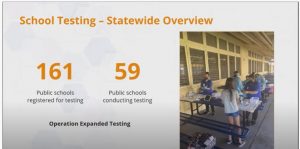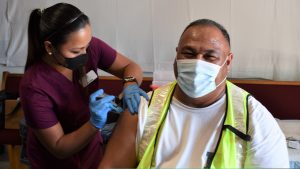DOH provides latest updates in the COVID-19 fight
Posted on Sep 27, 2021 in Capitol Connection, Featured, MainIf daily headlines have left you concerned and confused, here are some excerpts and additional information from a Sept. 15 legislative briefing by Dr. Libby Char and Dr. Sarah Kemble of the state Department of Health (DOH) to answer some of your questions. To see the briefing, go to https://www.youtube.com/watch?v=RVedQFuneWE.
Community hospital status, oxygen supply and outreach – “Our hospitals are still at very high capacity,” said Dr. Char, but Hawai‘i’s oxygen supply has stabilized. “Also, we have more than quadrupled the amount of testing we’re doing in the state. We’re trying to pair testing and vaccination with community health to answer people’s questions. It doesn’t mean everybody is going to get vaccinated, but at least we know we’re providing factual information. Public health education should be back in the community. That’s where we want to be.”
Hawai‘i Crisis Standards of Care plan – The plan, considered a “living document that can be updated,” was created in 2020 by a group of Hawai‘i’s leading medical experts, along with kūpuna, persons with disabilities, and community members. “We hope we never, ever get in a situation where we have to use this, but the thought was, ‘We should do this ahead of time, to have a logical, reasonable, compassionate and fair way if it gets down to the point where we can’t meet everybody’s needs,‘” said Dr. Char. . . .We absolutely do not want to play God.” (Noted in the plan: “Advanced age was rejected as a primary triage criterion because it discriminates against the elderly. Age already factors indirectly into any criteria that assess the overall health of an individual.) For details, including an appeals process and other COVID-19 “tie-breaker” factors, go to https://health.hawaii.gov/coronavirusdisease2019/files/2021/09/Hawaii-Crisis-Standards-of-Care-Triage-Allocation-Plan-and-FAQs.pdf.

The Department of Health is working closely with schools statewide to monitor COVID-19 cases on campuses and provide more support.
Operation Expanded Testing and other COVID-related school services – Dr. Kemble described working closely with public, private and charter schools statewide to provide an integrated COVID-19 response on the campuses. This includes regular K-12 testing, hiring more public health nurses for schools, and expanding case and cluster investigation teams. “Through Operation Expanded Testing, we have 161 public schools registered so far for testing and 59 schools already conducting tests. (An additional 13 charter schools have started testing.) This program allows schools to receive test kits, administer those tests on campuses, send them in for results and get those results back to the students, staff and schools so they can take action. The results are reported to DOH through electronic laboratory reporting.”
Monoclonal antibody therapy – “It’s a treatment that provides a temporary boost of immunity for people who are at high risk of having a really bad outcome from COVID. If we give it to you early on (before hospitalization), it can prevent you from getting really sick. It’s not a panacea, but it can prevent you from dying or being hospitalized,” said Dr. Char. According to the FDA, the therapy is not a substitute for vaccination and needs to be administered within the first 10 days of symptom onset.
Third doses versus boosters – “Currently, the FDA has approved a third dose of vaccines for those who are immunocompromised because of other medical conditions,” said Dr. Char. She explained a third dose helps these individuals get the full protection others get from two doses of the vaccine. Also, since Dr. Char’s briefing, the FDA and the CDC have recommended authorization of a booster shot of the Pfizer vaccine for people 65 years and older and individuals age 18 to 64 who are at high risk of severe COVID-19.


